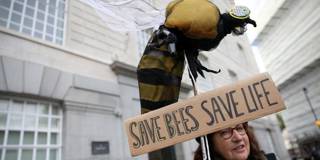Human economic activity makes extensive use of the ecosystem services nature provides, but these barely feature in measurements of GDP. It is vital to restore nature to economic analysis and policy before the damage to the natural world – and thus to everybody’s standard of living – becomes irreparable.
CAMBRIDGE – “This land is your land,” sang the American folk singer Woody Guthrie, listing the redwood forests, wheat fields, and golden valleys of the United States. Guthrie was making a moral claim that everyone should be able to share in the riches of the land. But his song also highlights the economic truth that the use of natural resources affects everyone. In particular, if we deplete or irreversibly degrade them, the economic consequences affect all of us and future generations.
Human economic activity makes extensive use of the ecosystem services nature provides. Classical economists such as Adam Smith and David Ricardo, who wrote at a time when agriculture accounted for a much greater share of the economy than it does today, were well aware that human activity occurred within the natural world and relied on nature’s bounty. They always included land in their analyses. But modern economics has largely excluded nature from definitions and measurements of the economy.
Today, of course, the risks posed by climate change are attracting more attention, including from investors. But many other aspects of nature’s role in economic activity have been overlooked until now.

CAMBRIDGE – “This land is your land,” sang the American folk singer Woody Guthrie, listing the redwood forests, wheat fields, and golden valleys of the United States. Guthrie was making a moral claim that everyone should be able to share in the riches of the land. But his song also highlights the economic truth that the use of natural resources affects everyone. In particular, if we deplete or irreversibly degrade them, the economic consequences affect all of us and future generations.
Human economic activity makes extensive use of the ecosystem services nature provides. Classical economists such as Adam Smith and David Ricardo, who wrote at a time when agriculture accounted for a much greater share of the economy than it does today, were well aware that human activity occurred within the natural world and relied on nature’s bounty. They always included land in their analyses. But modern economics has largely excluded nature from definitions and measurements of the economy.
Today, of course, the risks posed by climate change are attracting more attention, including from investors. But many other aspects of nature’s role in economic activity have been overlooked until now.